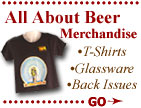
| ||||
| AAB Departments |
| ...Beer Features |
| ...Beer Talk |
| ...Pull Up A Stool! |
| ...What's Brewing |
| ...Beer Travelers |
| ...Stylistically Speaking |
| ...Beer & Food |
| ...Homebrewing |
| ...Collectibles |
| ...Marketplace |
| Beer Lovers' Resources |
| ...World Beer Festival |
| ...Brew Cruise Info |
| ...AAB Merchandise |
| ...AAB Bookstore |
| ...Beer Links |
| About the Magazine |
| ...Subscription Info |
| ...Retail the Magazine |
| ...Advertising Info |
| ...Contact AAB |

|
Though an immigrant, Bennewitz managed to get brewpubs legalized in North Carolina, navigated the local dry laws, and in 1986 opened the Weeping Radish in Manteo. Now, the new Weeping Radish Farm Brewery in Currituck, NC, integrates all of Bennewitz’ diverse passions about food, health and community at one site. A couple of years ago, you speculated that one problem beer has—that wine has overcome—is that beer hasn’t capitalized on its connection to agriculture. True. If you look at wine in North Carolina, a brewer is absolutely envious. The Department of Agriculture supplies wineries with funds, billboards, brochures. Wow. In fact, wine and beer, we are both craft industries, we are very similar, we both go back thousands of years. Your latest project brings all of this full circle. It really does. Being in the farming business, which I still am, and the beer business, I saw more and more parallels. The reason why microbrewed beer is so much better than conventional beer—it’s an issue of the [length of the] food chain. The best beer you ever see is perhaps at Oktoberfest in Munich. They make it, they age it for six months, they haul it across town and serve it in the beer tents they same day they tap it from the brewery. Small-scale farming is the same way.
The farmers’ markets are superior
in their products. Why? Because the
farmer digs the vegetables the night
before and hauls it to the market. Our mission as a little business is to reduce the food chain from 2,000 miles to 200. If you do that, now you have natural food and natural beer. With vegetables, it’s fairly straightforward: you have a farmers’ market, and it works. The problem is meat. You can’t just take a little cow, chop it up and take it to market. It doesn’t work: there is another skill level involved. And that is the master butcher. He is a qualified craftsman, just like the brewer. Our concept is the celebration of craft: the craft of brewing, the craft of butchering, the craft of farming, and the culinary craft. And the other two crafts that are critical to a community are arts and music. We have an upstairs for those, where we can have festivals and events. Then you can bring all the crafts and the community together. So this is in Currituck? This is in Currituck. It’s a 15,000 square foot building. We have a 14-acre organic farm in the back. Its divided between an organic farm, and a butchery that is a joint venture with a fifth generation German master butcher. What is the interaction between the brewery, the farm and the butchery? All three are working together: we did a barbecue in the butchery that used Black Radish beer; we have a liverwurst (that is really a liver pâté) made with 40% sweet potato content—it’s extraordinary. And the smokehouse will smoke malt for rauchbiers. So you see, we’re integrating the natural beer, the natural meat and the natural vegetables all into a group. We want to take it to the waste cycle. Our goal is to go to the community and say, “Whatever is compostable, we’ll pick it up. We’ll take our meat, our beer, our vegetables to your store and we’ll pick up compostables on the same trip, take it back to the farm and it becomes fertilizer on the farm.” There’s a direct correlation between food chain, quality of food and flavor. The further you go, the less flavor you have left. Beer, meat, vegetables: it’s the same story. |









